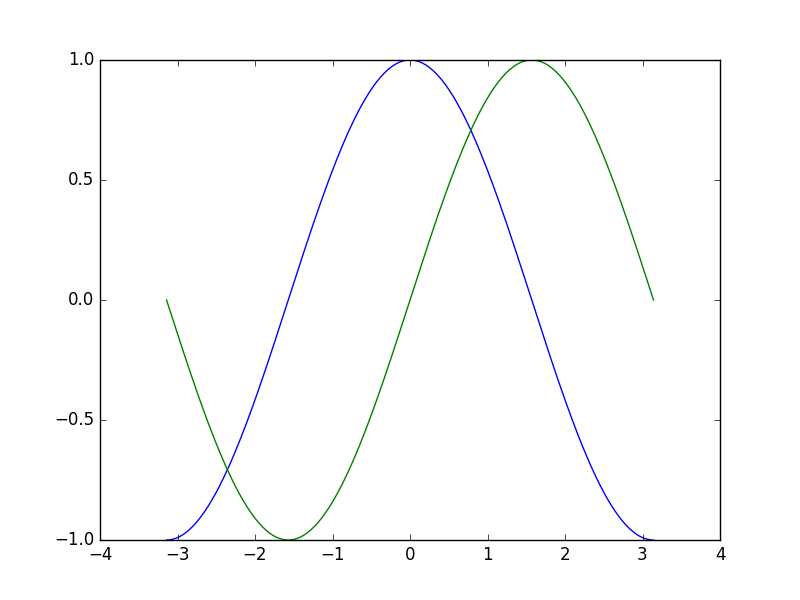标签:
感谢
非常感谢Bill Wing和Christoph Deil的审阅和更正。
作者:Nicolas Rougier, Mike Müller, Gaël Varoquaux
本章内容:
4.1 介绍
Matplotlib可能是二维图形中最常用的Python包。它提供了一个非常快的可视化Pyhton数据的方法和许多可供发布的格式化图形。我们要以交互方式探索Matplotlib大多数常见情况。
4.1.1 IPython和Matplotlib模式
Ipython是一个增强的交互式Python Shell。它有许多有趣的功能,包括命名输入和输出、访问Shell命令、改进调试和更多内容。它是Pyhton中科学计算工作流的核心,与Matplotlib结合一起使用。
关于Matlab/Mathematica类似功能的交互式Matplotlib会话,我们使用IPython和它的特殊Matplotlib模式,使能够非阻塞绘图。
Ipython console 当使用IPython控制台时,我们以命令行参数--matplotlib启动它(-pylab命令被用在非常老的版本中)
IPthon notebook 在IPthon notebook中,我们在notebook的起始处插入以下魔法函数:%matplotlib inline
4.1.2 pyplot
pyplot为matplotlib面向对象的绘图库提供了一个程序接口。它是接近于Matlab的建模工具。因此,plot中的大多数绘图命令都具有类似的Matlab模拟参数。重要的命令用交互示例解释。
from matplotlib import pyplot as plt
4.2 简单绘图
在本节中,我们要在同一个图上绘制余弦和正弦函数,我们将从默认设置开始,逐步充实图形,使其变得更好。
第一步:获取正弦和余弦函数的数据
import numpy as np X = np.linspace(-np.pi, np.pi, 256, endpoint=True) C, S = np.cos(X), np.sin(X)
X现在是一个numpy数组,有256个值,范围从-π到+π(包括),C是余弦(256个值),S是正弦(256个值)。
要运行该示例,你可以在IPython交互式会话中键入它:
$ ipython --pylab
这使我们来到IPython命令提示符:
IPython 0.13 -- An enhanced Interactive Python. ? -> Introduction to IPython‘s features. %magic -> Information about IPython‘s ‘magic‘ % functions. help -> Python‘s own help system. object? -> Details about ‘object‘. ?object also works, ?? prints more. Welcome to pylab, a matplotlib-based Python environment. For more information, type ‘help(pylab)‘.
你也可以下载每个例子,使用常规Python命令运行它,但是你会失去交互数据操作。
$ python exercice_1.py
你可以通过点击相应的图形来获取每个步骤的源。
4.2.1 使用默认设置绘图

Documentation
import numpy as np import matplotlib.pyplot as plt X = np.linspace(-np.pi, np.pi, 256, endpoint=True) C, S = np.cos(X), np.sin(X) plt.plot(X, C) plt.plot(X, S) plt.show()
4.2.2 实例化默认值
Documentation
import numpy as np import matplotlib.pyplot as plt # Create a figure of size 8x6 inches, 80 dots per inch plt.figure(figsize=(8, 6), dpi=80) # Create a new subplot from a grid of 1x1 plt.subplot(1, 1, 1) X = np.linspace(-np.pi, np.pi, 256, endpoint=True) C, S = np.cos(X), np.sin(X) # Plot cosine with a blue continuous line of width 1 (pixels) plt.plot(X, C, color="blue", linewidth=1.0, linestyle="-") # Plot sine with a green continuous line of width 1 (pixels) plt.plot(X, S, color="green", linewidth=1.0, linestyle="-") # Set x limits plt.xlim(-4.0, 4.0) # Set x ticks plt.xticks(np.linspace(-4, 4, 9, endpoint=True)) # Set y limits plt.ylim(-1.0, 1.0)
标签:
原文地址:http://www.cnblogs.com/yl153/p/5956104.html